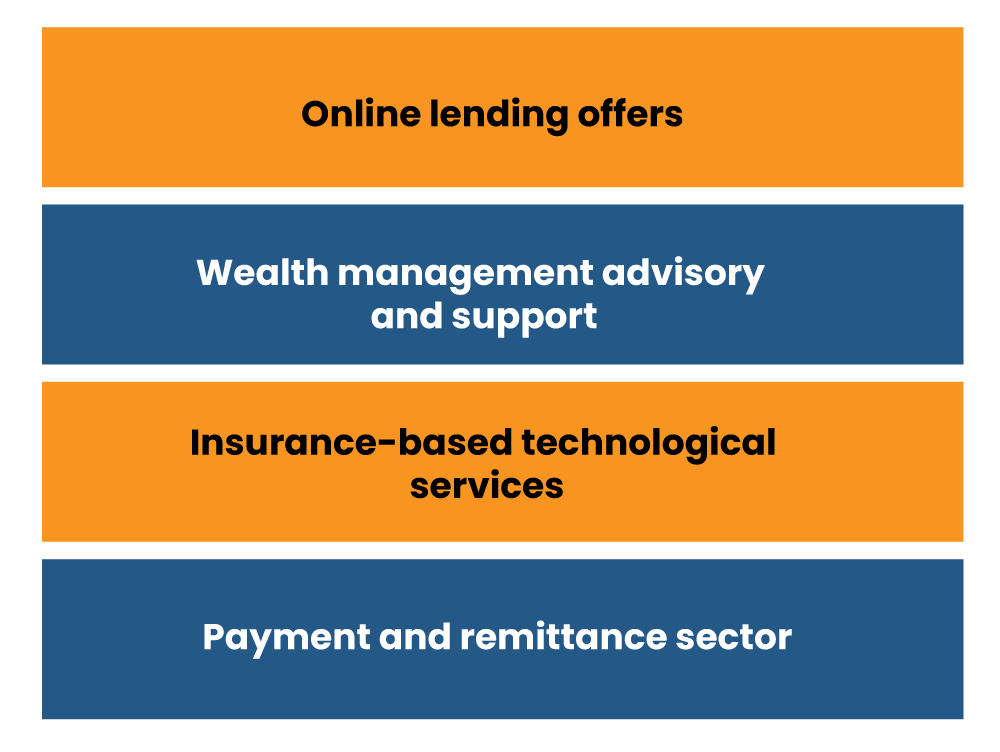The term “Fintech” is a combination of two vital facets of business- Finance & Technology. Fintech is a technology-cum solution that has proven its worth in the banking sector by improving its core functionality. And now it has stretched its footprint over other sectors such as insurance, payment gateway, asset management, and so on. It has been serving nations other than India since 1950 with the services like credit cards and ATMs. At this point, the impact of Fintech in the financial sector is beyond incredible. Every dominating industry in India is regulated by a specific regulatory body, and fintech is no different here. In this article, we shall focus on the Fintech Laws in India and regulations in India.
The prominence of Fintech in the Financial Sector
The ever-evolving technology in the market has led to the growth of fintech firms in India. These firms largely cater to bigger entities, small firms, and customers and allow them to manage their fiscal transactions efficiently. Moreover, it is also empowering financial firms to shift their focus from business-centric to customer-centric services. Presently, fintech is making its contribution in;


An Outlook on Services rendered by Fintech Industry
Currently, Fintech Industry can be found serving the following areas.
Crowdfunding Platforms
Fintech industries usually leverage technology that empowers startups and new businesses to raise capital without caring about national boundaries. The technology has ensured seamless access to international markets and investors for aspiring entrepreneurs.
Robo-Advisors
Robo-advisors are web-based investment management services that leverage algorithms to smartly allocated assets and create a portfolio for customers. Moreover, they also empower end-users, irrespective of age barrier, to make an investment at lucrative fees with minimal manual effort.
Mobile Payments
Mobile payment applications and gateways are some exemplary examples of Fintech’s reach. With such technologies, users can expect prompt financial transactions without even visiting the bank. The brands like PayPal and Venmo allows their clients to make a monetary transaction at cheap transaction fees.
Regtech
Regtech (aka regulatory technology) deals with the automation of compliance processes relating to financial avenues. Moreover, it ensures seamless and error-less management of massive data, including compliance records and transaction records.
Insuretech
The term insuretech refers to the deployment of technology within the insurance model, enabling firms to render customized insurance plans and data protection. Moreover, it helps simplify the insurance process via online policy management as well as claim filings.
Blockchain and Cryptocurrency
Blockchain largely relies on encrypted technology to create cryptocurrencies, a revolutionary digital currency that is more secure than fiat currency. In effect, blockchains render vast possibilities to undermine and modify traditional business models.
A smart contract is perhaps the best example of a blockchain application. Ideally, they are used to create self-executing contracts (written into lines of codes) between the concerned parties. The codes play a vital role in executing the agreement on the agreed terms. The technology seems to be groundbreaking because it is capable of connecting two parties that have never met before. Where In-person confrontation is apparent with the traditional practices of contract, smart contract omits such obligations by digitizing the whole process.
The subsequent section will shed some light on prevailing Fintech laws and regulations.
Read our article:Fintech Startups Aiming for NBFC License Despite Several Challenges
A Brief Explanation on Fintech Laws in India
Every technology has its downsides, no matter how advanced it is. Since fintech firm largely renders digitize solutions, it is also prone to patch holes, which can be negatively manipulated. And that’s where regulatory authorities come into the picture. By testing and governing the functional aspects, the regulator aims to prevent these firms from performing illicit operations. At present, fintech firms come under the ambit of RBI, IRDAI, SEBI, Ministry of Corporate Affairs[1], and Ministry of Electronics & Informative Technology. However, fintech firms that deal with P2P lending, account aggregation, payments, crypto currencies, etc are governed by the Reserve Bank of India.
The section below will render basic comprehension on existing Fintech Laws in India
Regulatory Sandbox (RS)
RS usually refers to the live testing of emerging products and services in a controlled environment. The RS permits executing field tests to gather evidence on the risks and pros of new financial innovations. The Reserve bank has already facilitated an Enabling Framework for Regulatory Sandbox on August 13, 2009.
The RS Framework is accessible to FinTech companies, banks, financial avenues, start-ups only. RS usually tests new products & services in the pre-launch stage to identify the potential vulnerabilities.
According to the IRDA notification released in 2019, the Regulatory Sandbox aims to serve the following purposes.
- The orderly development of the insurance sector
- Facilitating innovation
- Protection of interests of policyholders
Payment and Settlement Systems Act, 2007
It is an RBI-driven Act that oversees and regulates financial transactions in India. The Reserve Bank of India has implemented two regulations under this Act, namely;
- Board for Regulation and Supervision of Payment and Settlement Systems Regulations, 2008 (aka BPSS Regulations)
- Payment and Settlement Systems Regulations, 2008
Given the powers bestowed by RBI, BPSS is liable for;
- Authorizing and prescribing policies
- Setting standards for regulating
- Supervising the payment and settlement systems
On the contrary, the PSS Regulations, 2008 set out the procedural requisites for starting and executing the payment system.
Regulation of Prepaid Payment Instruments (PPIs) by the Reserve Bank of India
Prepaid Payment Instruments (“PPIs”) refers to instruments that enable the purchase of goods & services, including remittance facilities, financial services, etc., corresponding to the value available in such instruments.
Regulation of Payment Intermediaries by the Reserve Bank of India
In 2009, RBI came up with the master directions, given section 18 of the PSS Act, dealing with the following areas with consumer’s interest in mind.
- Opening and Operation of Accounts
- Settlement of Payments for Electronic Payment Transactions Involving Intermediaries
Directions aim to augment the quality of the transaction and envision solidity on the legal front, making the process more secure and seamless for the end-users.
Moreover, the Reserve Bank has also rolled out the directions for the Regulation of Payment Aggregators and Payment Gateways last year u/s 18 read with section 10(2) of the PSS Act.
Payment Banks
A Payment Bank does seem like a traditional bank, but its scope of operation is quite narrow. They lack the rights of bestowing loans and credit cards to needy ones. Moreover, such banks come under the ambit of Companies Act, 2013 and section 22 of the Banking Regulation Act, 1949. The said Act has limited their operation to the acceptance of demand deposits, payments and remittance services.
NBFC Regulation
An entity running a FinTech business may have to seek an RBI license to function as NBFC if its falls within the underlying criteria. The 45-IA of the RBI Act, mandates NBFC to remain non-functional in the absence of RBI-certified registration or a net owned fund of Rs. 25,00,000, and not surpassing Rs 100,00,00,000.
Conclusion
We hope that the above section has bestowed the best possible explanation on Fintech laws in India and regulations. However, if you think that we have missed something relevant to this topic, let us know.
Read our article:RBI Issues New Guidelines for Payment Aggregators











